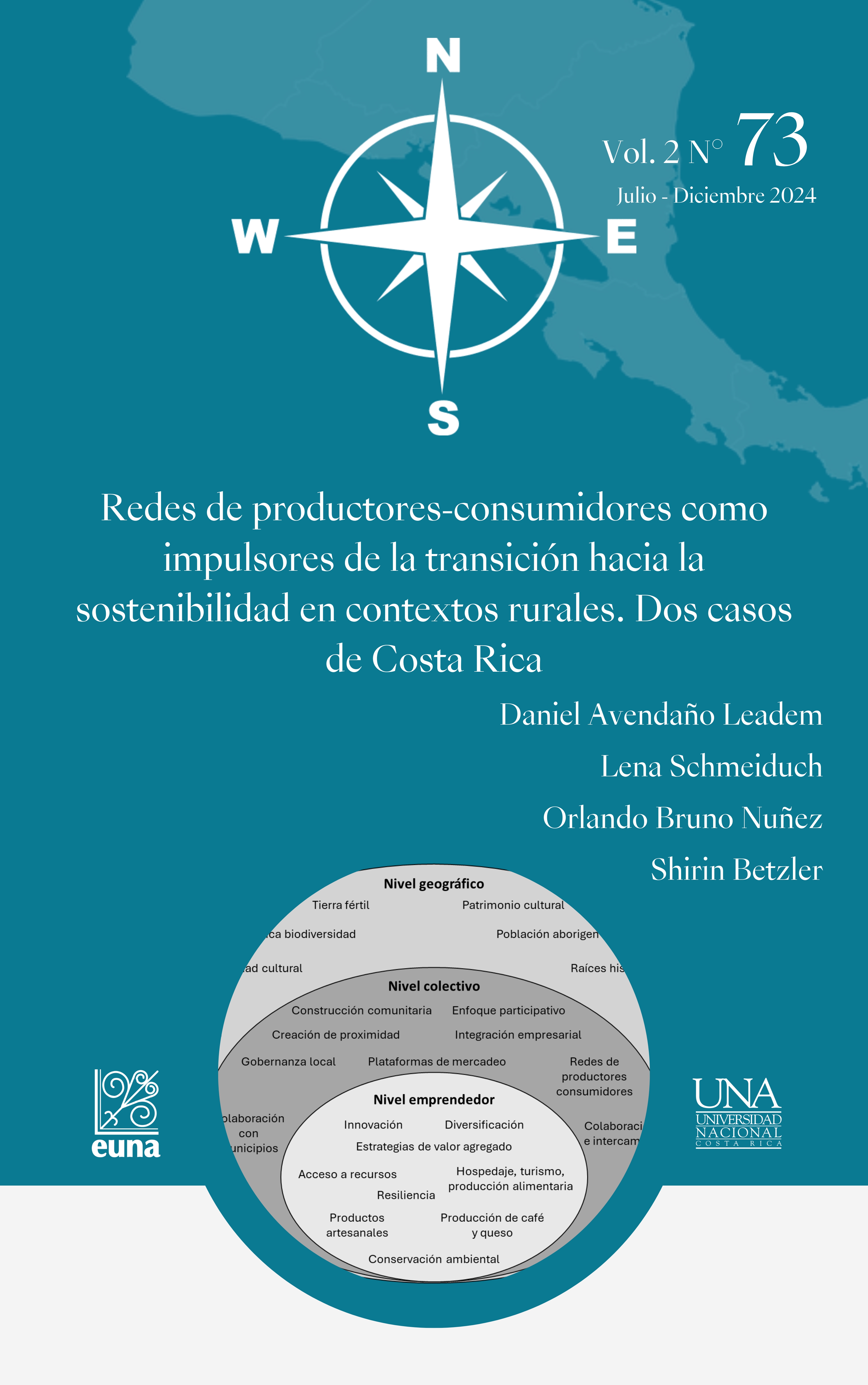Producer-consumer-networks as drivers of sustainability transition in rural regions. Two cases from Costa Rica
DOI:
https://doi.org/10.15359/rgac.73-2.5Keywords:
Sustainability transition, innovation, entrepreneurial mindset and skillset, rural development, sustainable community buildingAbstract
Successful sustainability transitions are crucial to answer to ongoing crises. Focusing strongly on biocultural heritage, local customs, and traditions, as well as the natural environment and landscape aesthetics, rural regions have great potential to promote sustainable development and growth. This sustainable development of rural regions further contributes not only to local, but also to national and supranational development by strengthening sustainable economic growth, alleviating unemployment, and poverty, and improving living conditions. Local entrepreneurs are continuously included in discussions on sustainability transitions in rural regions as an important driver through their innovative entrepreneurial activities. By comparing two example regions within rural areas of Costa Rica - the Dota and Turrialba region - the role of these entrepreneurial endeavors is illustrated. For this purpose, we exemplify how both regions contribute to rural, sustainable development based on their geographical, entrepreneurial, and collective characteristics. Specifically, the role of entrepreneurs’ specific mind- and skillset, their embeddedness in producer-consumer-networks and the encompassing geographical context is investigated. Implications on the different levels of analysis are drawn in terms of learning opportunities for both, the respective included regions, as well as supra-regional development in a broader sense. The sCoRe project is presented as an exemplary initiative designed to foster collaboration between rural entrepreneurs and academic initiatives to enhance local producer-consumer-networks, and thus contribute to the establishment of sustainable communities.
References
Aboelela, S. W., Larson, E., Bakken, S., Carrasquillo, O., Formicola, A., Glied, S. A., Haas, J. & Gebbie, K. M. (2007). Defining interdisciplinary research: Conclusions from a critical review of the literature. Health services research, 42(1), 329-346.

Downloads
Published
How to Cite
Issue
Section
License
Copyright (c) 2024 Daniel Avendaño Leadem, Lena Schmeiduch, Orlando Bruno Nuñez, Shirin Betzler

This work is licensed under a Creative Commons Attribution-NonCommercial-ShareAlike 4.0 International License.
Proposed policy for journals offering Open Access
Authors publishing their works in the Journal acknowledge and agree to the following terms:
a) Authors retain the copyrights to their works and guarantee the Journal the right to be the first to publish their works, under the Creative Commons License Attribution-NonCommercial-ShareAlike 4.0 International, CC BY-NC-SA 4.0 International (https://creativecommons.org/licenses/by-nc-sa/4.0/deed.es), which allows others to share works upon complying with the acknowledgment of authorship and mention of the Journal as the original publisher of the work.
b) Authors are permitted to separately establish additional agreements for the non-exclusive distribution of the official edition of the work published in the Journal (for example, authors may desire to place the work in an institutional repository or incorporate it into a book that is to published elsewhere) so long they acknowledgment to recognize the Journal as the original publisher. The aforementioned additional agreements must respect the terms of the non-profit character and sharing philosophy of the original license (CC BY-NC-SA 4.0 International, https://creativecommons.org/licenses/by-nc-sa/4.0/deed.es).
c) Authors are encouraged to archive the post-print or editor/PDF version in Open Access repositories.





 REVGEO is licensed under https://creativecommons.org/licenses/by-nc-sa/4.0/deed.es
REVGEO is licensed under https://creativecommons.org/licenses/by-nc-sa/4.0/deed.es
.svg_4.png)

_(1).png)
_(1)_(1)_(1)_1.png)
(2)(1)(1)(1).png)
